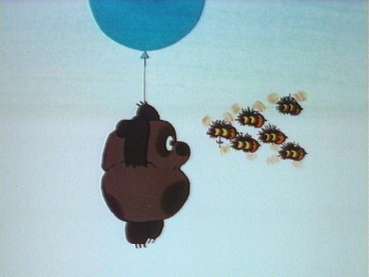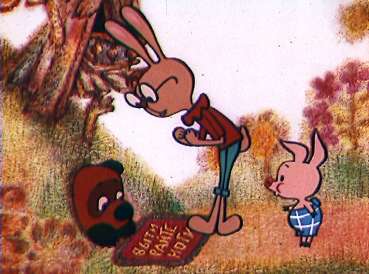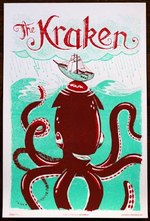
It's like Winnie the Pooh, without the rampant capitalism. Literally. In 1969-1972, Fyodor Khitruk, who is considered the pioneering figure of post-Stalinist Soviet animation, made three short films about Vinni Puh, based on the Russian translation of A.A. Milne's Winnie The Pooh.

For reasons I don't quite understand, even after several quick Wikipedia readings, animation was allowed a great deal of creative freedom and autonomy in the Soviet Union, and Khitruk's work is incredible. I love watchin Puh walk, but mostly I love seeing a different interpretation of classic stories and characters that have been largely homogenized and commodified. [Yeah, capitalism!]
According to Russian speakers, who grew up memorizing the Khitruk version, the songs and dialogue are full of hilariously witty puns and rhymes. But then I think it's just fine to watch it without understanding a word, so go figure. The kid doesn't read subtitles yet anyway.
Vinni Puh, 1969, dir. Fyodor Khitruk
gets stuck at Rabbit's house: Vinni Puh Is Going On A Visit, 1971
Hangs out with Eeyore: Vinnie Puh And The Day Of Care [youtube viaLilipip.com, which has a growing collection of interesting, short-form, downloadable content for kids]
images, there's a lot more where they came from: Vinni Puh film information and stills, and Fyodor Khitruk's other films [animator.ru]


Animation was huge there. I wonder if it's a logical offshoot of having so much large-scale graphic propoganda. Perhaps you expect those billboards to come to life. Probably also an offshoot of really treasuring the arts.
I'm assuming you're referring to the capitalism around the Winnie the Pooh brand and not the stories. I'm struggling to remember any plot lines that would have been offensive to the party.
I have a copy of the Hobbit I picked up while I was there. The illustrations are fascinating for seeing what happens when you don't have exposure to western ideas of swords and sorcery.
I feel in many ways like the Soviet Union is some sort of parallel universe to the United States that shows a completely different way we could have been.
The Soviets placed a sharp dividing line between popular entertainment and ideological propaganda (with occasional crossings of the line). The idea that everything in the USSR was a mouthpiece for the Party and the reigning ideology is a Western myth.